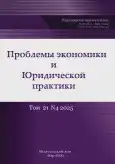Assessment of the socio-economic effects of financial and economic mechanisms of spatial development in the face of modern challenges: methodological approaches
- Authors: Popadyuka N.K.1, Pivovarova O.V.1
-
Affiliations:
- Financial University under the Government of the Russian Federation
- Issue: Vol 21, No 4 (2025)
- Pages: 159-165
- Section: Regional and Sectoral Economics
- URL: https://journal-vniispk.ru/2541-8025/article/view/316464
- DOI: https://doi.org/10.33693/2541-8025-2025-21-4-159-165
- EDN: https://elibrary.ru/FJXYAP
- ID: 316464
Cite item
Abstract
The article is devoted to the development of methodological approaches to assessing the potential socio-economic effects of implementing financial and economic mechanisms for the development of macroregions, urban agglomerations and single-industry towns in the context of a global phase transition. The relevance of the research is due to the overlap of inter-stage transformations—the transition to the sixth technological order and the formation of a new world economic order, which is associated with the emergence of cognitive and technological barriers and the increasing threats of a phase catastrophe. The purpose of the research is to provide theoretical and methodological substantiation and conceptualization of approaches to assessing the potential socio-economic effects of implementing financial and economic mechanisms for the development of macroregions, urban agglomerations and single-industry towns in new civilizational conditions. Comparative historical analysis, civilizational and systematic approach, scenario and institutional analysis are used in the methodological framework of the research. As a result, the need for consolidation of financial, economic and administrative resources, centralization of management within macroregions and agglomerations, and the transition to investment and innovation targeting is substantiated. The conclusions of the research emphasize the importance of subjectivity of territories, the formation of new exchange and infrastructure contours, the development of partnership models (public-private partnerships, inter-municipal unions) and the use of Industry 4.0 technologies. This will ensure the reproduction and development of the sociotechnical potential of territories in conditions of instability and increase their adaptability to future civilizational challenges.
Full Text
##article.viewOnOriginalSite##About the authors
Nikita K. Popadyuka
Financial University under the Government of the Russian Federation
Author for correspondence.
Email: nkpopadyuk@fa.ru
ORCID iD: 0000-0003-4235-6905
SPIN-code: 2207-0905
Dr. Sci. (Econ.), Leading Researcher of the Institute of Regional Economics and Interbudgetary Relations
Russian Federation, MoscowOlga V. Pivovarova
Financial University under the Government of the Russian Federation
Email: ovpivovarova@fa.ru
ORCID iD: 0000-0002-1755-5972
SPIN-code: 8844-5634
Cand. Sci. (Econ.), Leading Researcher of the Institute of Regional Economics and Interbudgetary Relations
Russian Federation, MoscowReferences
- Glazyev S.Y. The leap into the future: Russia in new technological and world economic structures. Second edition. Moscow: Knizhny Mir Publ., 2019. 768 p.
- Lavrikova Yu.G., Suvorova A.V. Heterogeneity of Economic Development of Russian Macroregions. Economy of Regions. 2023. No. 19 (4). Pp. 934–948. (In Rus.). doi: 10.17059/ekon.reg.2023-4-1. EDN: UFATKN.
- Makar S.V. Current components of sustainable spatial development in Russia: intact forest territories. Eurasian Law Journal. 2024. No. 2(189). Pp. 488–490. (In Rus.). EDN: SMXKTE.
- Makarov I.N., Fattakhov R.V. Development of specialized cities in china in the context of national spatial policy. Journal of International Economic Affairs. 2023. Vol. 13, No. 4. Pp. 805–818. (In Rus.). doi: 10.18334/eo.13.4.119183. EDN: SQHYOM.
- Medovichev A.E. From the palace civilization of the Bronze Age to the world of politics. Key problems of the Greek "Dark Ages" in modern foreign historiography // Periodization of history and "transitional periods" in modern foreign historiography: Collection of reviews and ref. RAS INION. The Center of social science-inform. Research Department of History; Ed. Metlitskaya Z.Y. Moscow: INION RAS, 2012. 142 p. EDN: PCBDKX.
- Orlov S.L. The priority of the Russian civilizational platform as a factor of sustainable development of the economic space. Review of Economy, the Law and Sociology. 2024. No. 1. Pp. 67–71. (In Rus.). EDN: KUMCPA.
- Popadyuk N.K. New forms of capitalization of the economic space of the region in the post-crisis period: monograph / N. K. Popadyuk; Financial University under the Government of the Russian Federation. Moscow : INFRA-M, 2022. 130 p. doi: 10.12737/1863098. EDN: OFJNQO.
- Popadyuk N.K. Social technology of participatory design as a counteraction to crisis phenomena. Management and Business Administration. 2025. No. 1. Pp. 61–68. (In Rus.). doi: 10.33983/2075-1826-2025-1-61-68. EDN: LRBHKF.
- Stroev P.V. Methodological foundations behind modern approaches to the spatial distribution of economic resources in Russia. Alter Economics. 2025. Vol. 22, No. 2. Pp. 185–202. (In Rus.). doi: 10.31063/AlterEconomics/2025.22-2.2. EDN: DGKMRC.
- Stroev P.V., Pivovarova О.V. Municipalities' role in the effective organization of the Russian economic space. Journal of Economics, entrepreneurship and law. 2024. Vol. 14, No. 8. Pp. 4649–4662. (In Rus.). doi: 10.18334/epp.14.8.121270. EDN: DTVTXO.
- Fomin M.V., Smirnov O.O. Spatial development sustainability of Siberia and the Russian far east regions. Public Administration Issues. 2022. No. 1. Pp. 124–147. (In Rus.). doi: 10.17323/1999-5431-2022-0-1-124-147. EDN: KWCNDR.
- Kozlova O.A., Makarova M.N., Lavrikova Yu. G. Assessing the impact of socio-economic factors on public health in Russia. Population and Economics. 2024. Vol. 8, No. 1. Pp. 168–180. doi: 10.3897/popecon.8.e107234. EDN: XULDPA.
- Lampard E. The history of cities in the economically advanced areas. Economic Development and Cultural Change. 1955. Vol. 3 (2). Pp. 81–136. doi: 10.1086/449680.
- Minakir P.A., Isaev A.G., Demyanenko A.N., Prokapalo O.M. Economic macroregions: An integration phenomenon or political-geographical expediency? The case of the Far East. Regional Research of Russia. 2020. Vol. 10. Iss. 3. Pp. 327–343. doi: 10.1134/S2079970520030107. EDN: ZQTWUB.
Supplementary files








